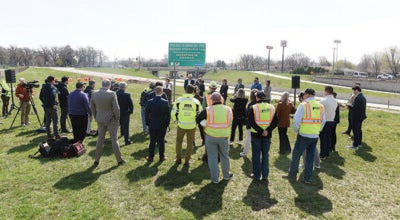Helping those in need
Published 6:29 pm Friday, February 22, 2019

- Vietnam War veteran Larry Weigel helps hand out medical equipment to those in need. - Colleen Harrison/Albert Lea Tribune
Veterans groups offer medical equipment to community
Larry Weigel’s cell is like the bat signal for those with mobility needs.
It rang just before 1 p.m. Thursday, a tinny, soft rock-esque jingle on the flip phone he uses only for calls relating to his work with the Disabled American Veterans, Chapter 16.
“DAV, this is Larry,” he said. “How may I help you?”
This time, it was a telemarketer. But just about every day, Weigel said, he does get a call asking for loaner medical — largely mobility-related — equipment.
In two storage units off South Broadway Avenue, the DAV and Veterans of Foreign Wars Post 447 have stacks of shower chairs, rows of wheelchairs, hospital beds, walkers with and without seats, electric scooter, portable commodes, lift chairs, canes and crutches.
A large, moveable magnetized light intended to help people read warps the corrugated metal siding of the storage unit into cold, psychedelic shapes.
“We’ve got a little bit of everything,” Weigel said.
Weigel is a veteran who spent seven years in the Army, serving for two tours of duty in Vietnam.
“I volunteered,” he said. “I tried to stay in the Army.”
But he was medically retired after his diabetes diagnosis in 1974. He said it was attributed to Agent Orange exposure.
The Vietnam War veteran has divvied out equipment to those who call for two years.
“I just figured somebody had to do it,” he said.
The statewide program is at least five years old, said VFW post commander Jim Cummins.
Because the program is run through a veterans organization, Cummins said they try to look for a veteran in the family of the person receiving the equipment.
“We’re very lax on that aspect of it,” he said.
Weigel is even more lenient.
“It doesn’t matter who you are,” he said.

The equipment Weigel loans out is done so at no cost to those borrowing it. – Colleen Harrison/Albert Lea Tribune
They try to keep it as open as possible to provide for the community, Cummins said.
“It’s expensive to rent or buy equipment, so if we’ve got it on hand, we’d much rather that we loan it out than have people have to go out and buy them or rent them,” he said.
According to Weigel, it is not often he does not have what someone needs when they call. The equipment is loaned out at no cost. Those using it can pick it up, but Weigel also delivers and collects pieces. He gets extra help with the hospital beds, which are too heavy and large for him to move alone.
Often, people who use the loaners do donate when they return the equipment, Weigel said. That money goes back into the equipment — for instance, to replace the batteries on motorized scooters, which are prone to lose juice sitting in a storage shed, especially in the cold weather.
Some of that funding came from Wegiel himself. His work won him the KAAL Pay it Forward award in 2017, for which he was given $600. Weigel donated it back to the DAV.
The equipment itself is all donated, too, he said. It comes from people who call and ask if he could use it, or who leave it at one of the 12 donation bins set up in Albert Lea and surrounding communities. One of the knee carts was out on the side of the road in Glenville with a “free” sign on it. Weigel picked it up for the storage unit. He cleans the equipment with soap and cloths (a task that is easier in the summer).
The most popular piece of equipment is a walker with a seat on it or a wheelchair, Weigel said. Most of the latter are loaned out for a month or longer.
“‘Go,’” he tells people. “‘Take it. Use it for as long as you need it.’”
Now, all the equipment is sent out with a sticker on it that has his phone number, so people can call when they are done with the equipment, or if someone is cleaning out possessions after someone has passed away.
The most time Weigel said he has spent on the program is 25 to 30 hours a week. It can be a lot of work sometimes.
“I spend so much time doing this stuff for other people,” he said. “I don’t get a lot out of it. I get a lot of thank-yous and appreciation for doing it, and that’s all I need.”
But he said the work keeps him healthy and moving around.
“I’ll keep doing it as long as I can,” he said.
Those in need of equipment can call 507-318-0199.






